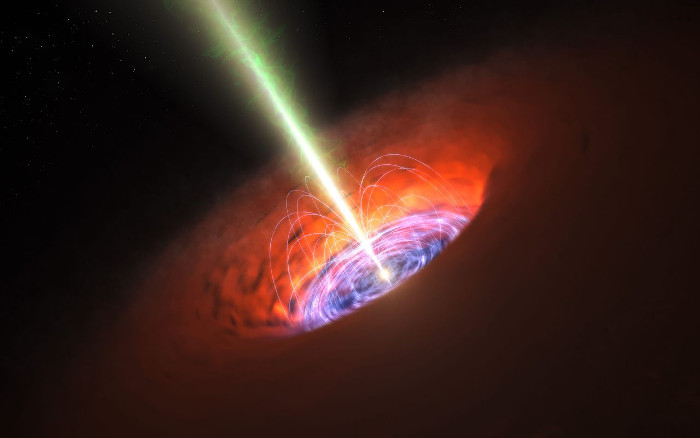Stephen Hawking: Black hole has 'hair'
New hypothesis by astrophysicist Stephen Hawking and his colleagues suggest that black holes can wear a hair made of "ghost" particles without energy.
According to a draft published on January 5 in arXiv magazine, some information sucked into the black hole is stored in these "hair" strands.
However, the research results do not help prove that all information entering the black hole is preserved."We cannot answer the question of whether all the information inside the black hole is stored in this way," said physicist Andrew Strominger of Harvard University in the United States, one of the authors. know.
According to Einstein's general theory of relativity, black holes are cosmic objects with an extremely dense density that is enough to warp space - time . The gravitational pull of the black hole is so strong that there is no light or any matter escaping from their attraction. According to the US Aeronautics Agency (NASA), some primitive black holes formed shortly after the Big Bang with the size of an atom but weighed about the same as a mountain. Other black holes form when giant stars die and shrink and supermassive black holes exist in the center of most galaxies.
In the 1960s, physicist John Wheeler and his colleagues had suggested that black holes "without hair" , metaphorically speaking, meant that black holes had no complex properties . According to Wheeler's proposal, all black holes are identical except for physical quantities of spin, angular momentum and mass.

A black hole surrounded by gas disks, radiation and magnetic fields.(Photo: ESO / L).
Later, in the 1970s, Stephen Hawking introduced the concept called "Hawking radiation" . In Hawking's formula, all black holes lose their mass through "ghost" quantum particles that escape from the black hole into space. Finally, Hawking radiation causes the black hole to completely evaporate. The vacuum zone remains after the evaporating black hole is unable to store information about the black hole.
Because Hawking radiation randomly escapes from the black hole, the information inside the black hole disappears over time and there is no way to find out about their origin. However, this creates a paradox. According to quantum theory, information has existed in the past, so it is completely recoverable. In recent years, Hawking has reconsidered the concept of information loss and acknowledged that black holes store information.
After many years, Strominger has drawn some important conclusions. Through calculations, Strominger joined Hawking and Malcolm Perry, two physicists at Cambridge University, UK, to discover when adding "soft" photons - a light particle with no energy, a vacuum after the black hole is loading. steam has constant energy but angular momentum will change. That means the vacuum state of the black holes evaporates differently. The specific characteristics of this vacuum depend on its origin and history.
"It's like a large-capacity hard drive that can store an infinite amount of information in the form of energy-free photons and gravitons," Strominger told Live Science. However, the information is very chaotic.
According to Aidan Chatwin-Davies, a physicist at the California Institute of Technology, the new study is not the final answer to the problem of finding information in black holes, but it is a step in the right direction.
- Black hole and Hawking paradox
- Stephen Hawking makes the hypothetical hypothesis of a black hole
- Universe origin according to Stephen Hawking's theory
- Stephen Hawking: People should use the energy of black holes to generate electricity
- The argument rejects Stephen Hawking's hypothetical black hole universe
- Albert Einstein was wrong, there was no black hole in the universe?
- Voiceover Hawking's physics genius into space
- Hawking physicist: Black hole with back door
- 10 fascinating facts about black holes
- Stephen Hawking revealed a new path to other universes
- What did genius Stephen Hawking say in his last interview with the BBC?
- Startled to predict the death of scientist Stephen Hawking
 Van Allen's belt and evidence that the Apollo 11 mission to the Moon was myth
Van Allen's belt and evidence that the Apollo 11 mission to the Moon was myth The levels of civilization in the universe (Kardashev scale)
The levels of civilization in the universe (Kardashev scale) Today Mars, the sun and the Earth are aligned
Today Mars, the sun and the Earth are aligned The Amazon owner announced a secret plan to build a space base for thousands of people
The Amazon owner announced a secret plan to build a space base for thousands of people